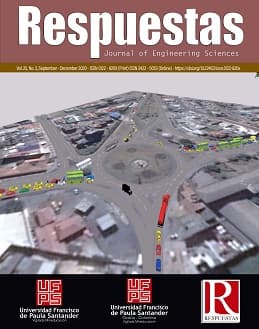Relationship to phonological awareness and engineering literacy
Relación con la conciencia fonológica y la alfabetización en ingenieros
Main Article Content
The research identifies storytelling concepts in engineers from university professors. The research follows a qualitative approach applied to 250 participants from universities in the Norte de Santander department. The results identify three categories associated with the application of science, the function of the history of engineers and scientific production. It is concluded that participant’s concept storytelling as the art of telling a story and a didactic resource associated with approaches, the development of skills, useful to analyse the development of discoveries in engineers, its actors, its application in scientific advances and its contribution to innovation and community development. The correlation between the variables reading and writing and phonological awareness is statistically significant, with a confidence of 95%, which shows that engineers who presented low scores in writing also denoted low results in phonological awareness.
Downloads
Publication Facts
Reviewer profiles N/A
Author statements
Indexed in
- Academic society
- Universidad Francisco de Paula Santander
- Publisher
- Universidad Francisco de Paula Santander
Article Details
L. Kornelsen, “The Role of Storytelling at the Intersection of Transformative Conflict Resolution and Peace Education”. Storytelling, Self, Society, vol. 9, pp. 237-260, 2013.
S. A. Madva, “Mentoring Through Storytelling Litigation”. vol. 28, no. 3, 2002.
S. Hinton, “The Art of Storytelling in America”. USA: Columbia University, 2001.
P. Koehler, “Telling God's Stories with Power: Biblical Storytelling in Oral Cultures”, Pasadena: William Carey Library, 2010.
P. S. Cohen, “Theories of Myth Man New Series”, vol. 4, pp. 337-353, 1969.
J, Riascos, “Ancient and Indigenous Stories: Their Ethics and Power Reflected in Latin American Storytelling Movements”, Marvels & Tales, vol. 21, no. 2, pp. 253, 2007.
D. M. Boje, “The Storytelling Organization: A Study of Story Performance in an Office- Supply Firm”, Administrative Science Quarterly, vol. 36, no. 1, pp. 106-126, 1999.
J. H. Lockwood, “Bennett, Noddings, and Reconstruction of Moral Storytelling: Three Levels of Moral Education”, Journal of Thought, vol. 31, no. 3 pp. 5, 1996.
S. Fernandes, “Curated Storytelling: Uses and Misuses of storytelling”, Oxford: Oxford University Press, 2017.
J. Gottschall, “The Storytelling Animal: How stories makes us human”, NY:Houghton Mifflin Harcourt Publishing Company, 2014.
F. Gol, “Biosemiotic Medicine: Healing in the World of Meaning”, Berlin/Heidelberg: Springer, 2016.
R. Méndez-Suárez, “Resultados Nacionales de las pruebas saber 5o y 9º 2009”, Revista Internacional Magisterio Educación y Pedagogía, vol. 51, pp. 78-95, 2011.
A. O. Sierra, M. Vergel-Ortega and J. P. Rojas.Suárez, “Microenseñanza en cálculo vectorial: su impacto desde un enfoque basado en competencias”, Ecoe Ediciones, Bogotá, 2019
D. Chambers, “Storytelling: The Neglected Art”, Elementary English, vol. 43, no. 7, pp. 719, 1966.
T. Massaro, “Empathy, Legal Storytelling, and the Rule of Law: New Words, Old Wounds?”, Michigan Law Review, vol. 87, no. 8, pp. 2099. 1989
M. Maxmeister, “Storytelling for change: story-centered learning for the twenty-first century visionary”, NY: Amazon Kindle, 2017.
C. Dillon, “Telling the Gospel Through Story: Evangelism That Keeps Hearers Wanting More”, Downers Grove: IVP Books, 2012.
F, Carrero, “La comprensión lectora en el alumnado sordo desde la perspectiva de la escuela inclusiva”, IJERI: International Journal of Educational Research and Innovation, no. 8, pp. 206, 2017.
E, Romero-Ramirez, M. Vergel-Ortega, J. M. Torres, “Representaciones sociales de estudiantes universitarios sobre el aprendizaje del cálculo y la química”, Uniediciones. Ibañez S.A.S, Bogotá, 2020.
E. L. Ovalle, C. A. Gomez Colmenares and M. Vergel Ortega, “Geocatatum: Its influence on the development of children‘s geometric thinking”, Journal of Physics: Conference series, vol. 1414, no. 2, 2019.
M. Vergel-Ortega, C. S. Gómez-Vergel and J. F. Caravalho-Casanova, “Cuentos sobre las emociones de jóvenes universitarios durante el proceso de aprendizaje del cálculo en ingeniería”, Respuestas, vol. 25, no. 1, pp. 89-95, 2020. doi.org/10.22463/0122820X.2414.
J. Senehi, “Constructive Storytelling: A Peace Process Peace and Conflict Studies”, vol. 9, no. 2, 2002.
M. Vergel-Ortega, J. Martínez and F. Nieto, “Validez de instrumento para medir el aprendizaje creativo”, Comunicaciones en Estadística, vol. 9, no. 2, pp. 241, 2016.
J. Peck, “Using Storytelling to Promote Language and Literacy Development”, The Reading Teacher vol. 43, no. 2, pp. 141, 1989.
C. Gallo, “The Storyteller's Secret: From TED Speakers to Business Legends, Why Some Ideas Catch On and Others Don't”, New York: St Martin's Griffin, 2017
H. Woodhouse, “Storytelling in University Education: Emotion, Teachable Moments, and the Value of Life”, The Journal of Educational Thought (JET) / Revue de la Pensée Éducative, vol. 45, no. 3, pp. 237, 2011.
M.F. Largo-Leal, J.P. Rojas and M. Vergel-Ortega, “La Empatía en el Aprendizaje de los Estudiantes de Educación Básica Desde la Perspectiva de la Interacción Social”, ECOE Ediciones, Bogotá, 2020.








